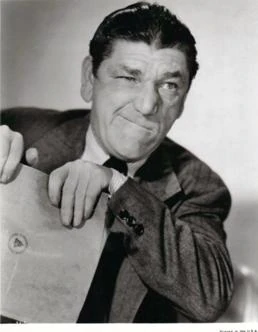Shemp Howard remains one of the most intriguing figures in the history of comedy, yet his contributions to the world of entertainment often go overlooked. As the third Stooge in the early years of the act and later as a replacement for his younger brother Curly, Shemp carved out a unique niche for himself in Hollywood. His legacy continues to be celebrated by fans who appreciate his humor and charisma. Let's delve deeper into the life and career of this remarkable man.
The Early Years of Shemp Howard
Born Samuel Horwitz on March 11, 1895, in Philadelphia, Pennsylvania, Shemp grew up in a family that would eventually dominate the world of slapstick comedy. Known affectionately as Shemp due to his mother's thick Litvak accent, he was the older brother of Moe Howard and Jerome Curly Howard. Before joining The Three Stooges, Shemp enjoyed a modestly successful career in film, appearing in several Charlie Chan movies and other projects. His decision to leave the group in 1932 to pursue solo opportunities initially seemed like a wise move, but fate had other plans.
Returning to the Spotlight
In 1946, tragedy struck when Curly suffered a debilitating stroke, forcing him to step away from the spotlight. Reluctantly, Shemp returned to rejoin his brothers Moe and Larry Fine, filling the void left by Curly. Despite initial skepticism from fans who preferred Curly's wild antics, Shemp quickly proved his worth with his sharp wit and physical comedy skills. In fact, many critics argue that some of the best Three Stooges films were made during Shemp's second tenure with the group.
Shemp plays a gangster, fraudster, robber, and assassin in one memorable film, showcasing his versatility as an actor. His portrayal is so convincing that it almost seems believable—he even gets away with his crimes! This level of authenticity resonated with audiences, making Shemp a fan favorite among those who appreciated nuanced performances within the framework of slapstick humor.
A Unique Persona
What set Shemp apart from his contemporaries was his ability to appear relatable. Unlike the exaggerated personas adopted by Moe and Larry, Shemp exuded a certain realism that reminded viewers of someone they might encounter at large family gatherings—a slightly tipsy uncle or a mischievous cousin. This grounded quality endeared him to fans who craved authenticity amidst the chaos of The Three Stooges' universe.
Cultural Impact and Legacy
Despite his untimely death in 1955, Shemp Howard's influence extends far beyond his lifetime. Books such as Burt Kearns' SHEMP!: The Biography of The Three Stooges' Shemp Howard offer fascinating insights into his life, debunking myths while celebrating his achievements. Podcasts like The Dana Gould Hour dedicate episodes to exploring Shemp's impact on comedy, ensuring that new generations discover his talent.
Even today, Shemp Howard remains a beloved figure among enthusiasts. His great-granddaughter Chandler Isaac proudly carries forward his legacy, often seen holding books about her illustrious ancestor at events honoring his memory. The world continues to remember Shemp not just as a member of The Three Stooges but as an influential actor whose contributions deserve recognition.
Conclusion
While opinions may vary regarding Shemp Howard's place in comedy history, there can be no denying his significance. From his early days as part of The Three Stooges to his triumphant return after Curly's departure, Shemp consistently delivered laughter and joy to audiences worldwide. As we celebrate his birthday each year, let us take a moment to reflect on the profound impact he had on the industry and the countless lives he touched through his artistry.

